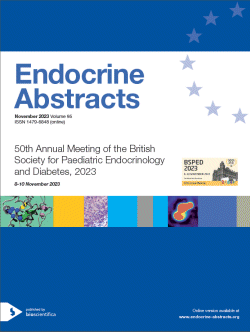
50th Annual Meeting of the British Society for Paediatric Endocrinology and Diabetes
Manchester,
UK
08 Nov 2023 - 10 Nov 2023

Poster Presentations
Miscellaneous/other 2
ea0095p130 | Miscellaneous/other 2 | BSPED2023
Patient attendance in virtual paediatric and adolescent gynaecology clinics since the COVID-19 pandemic
Soundararajan Keerthana , Elder Charlotte
ea0095p131 | Miscellaneous/other 2 | BSPED2023
Hypernetwork analysis: A novel approach for epigenome analysis, with Kabuki syndrome as an exemplar
Martirosian Evgenii , Cuvertino Sara , Garner Terence , Walusimbi Bridgious , Kimber Susan , Banka Siddharth , Stevens Adam
ea0095p132 | Miscellaneous/other 2 | BSPED2023
Initial accuracy and family experience evaluation of the Dexcom G7 continuous glucose monitor for hypoglycaemia due to hyperinsulinism
Worth Chris , Worthington Sarah , Ahmad Sumera , O'Shea Elaine , Salomon-Estebanez Maria , Banerjee Indraneel
ea0095p133 | Miscellaneous/other 2 | BSPED2023
Patient and public involvement: Techniques used to engage with children and young people about research in congenital adrenal hyperplasia
Tonge Joseph , Bacila Irina , Barker Nicki , Aslam Muniba , Salim Eliza , Walsh James , Phillips Bob , Krone Nils , Lawrence Neil
ea0095p135 | Miscellaneous/other 2 | BSPED2023
Rapid-onset obesity with hypoventilation, hypothalamic, autonomic dysregulation, and neuroendocrine tumors (ROHHADNET) syndrome: A case report
de Silva UAMD , Suntharesan J , Gunasekara B , Lakmini C , Atapattu N
ea0095p136 | Miscellaneous/other 2 | BSPED2023
Aortic valve disease in two females with congenital hyperinsulinism due to activating GCK mutation
Alhusaini Fatemah , Dastamani Antonia , Gilbert Clare , Flanagan Sarah , Alhomaidah Doha , Morgan Kate



